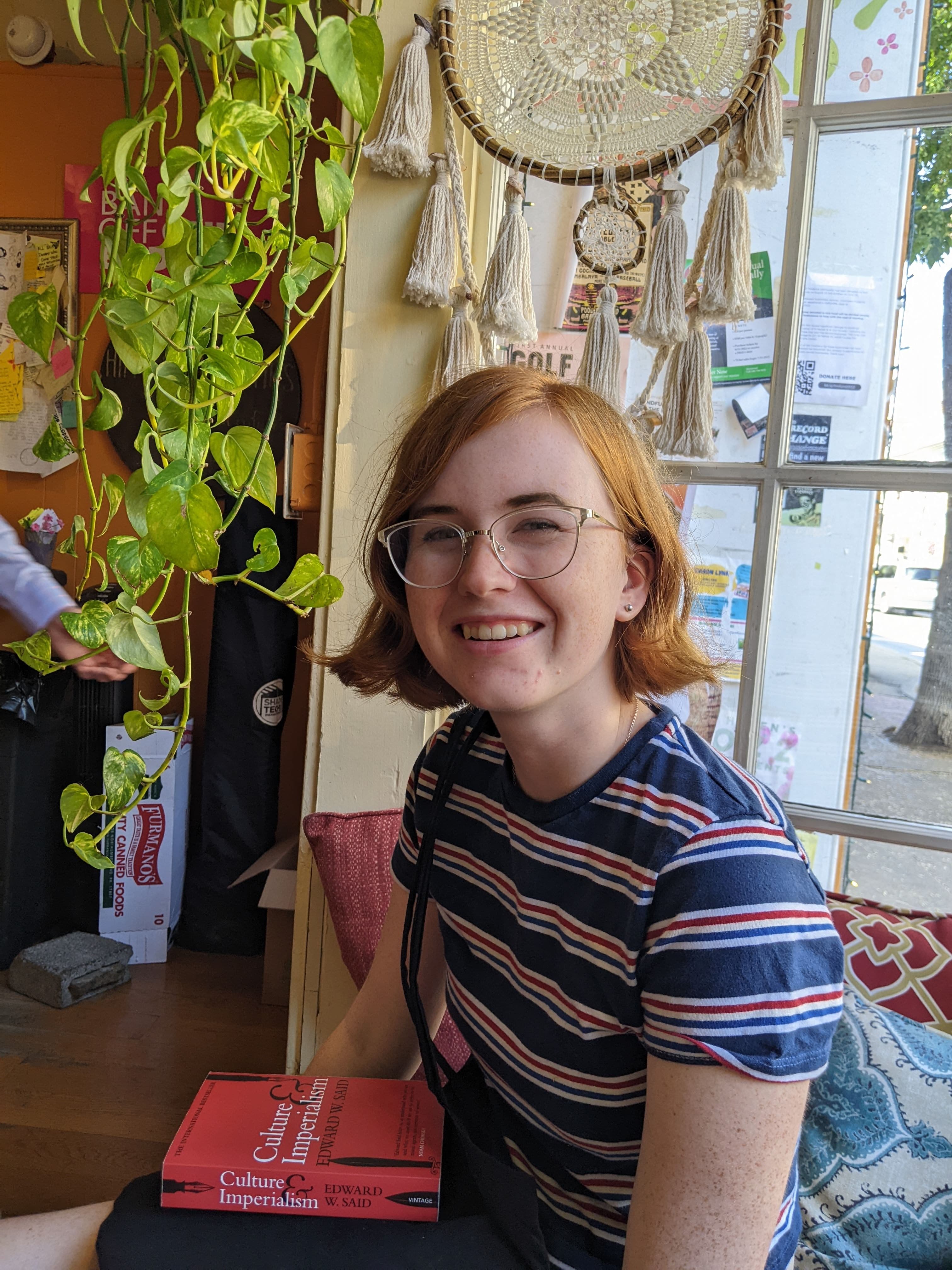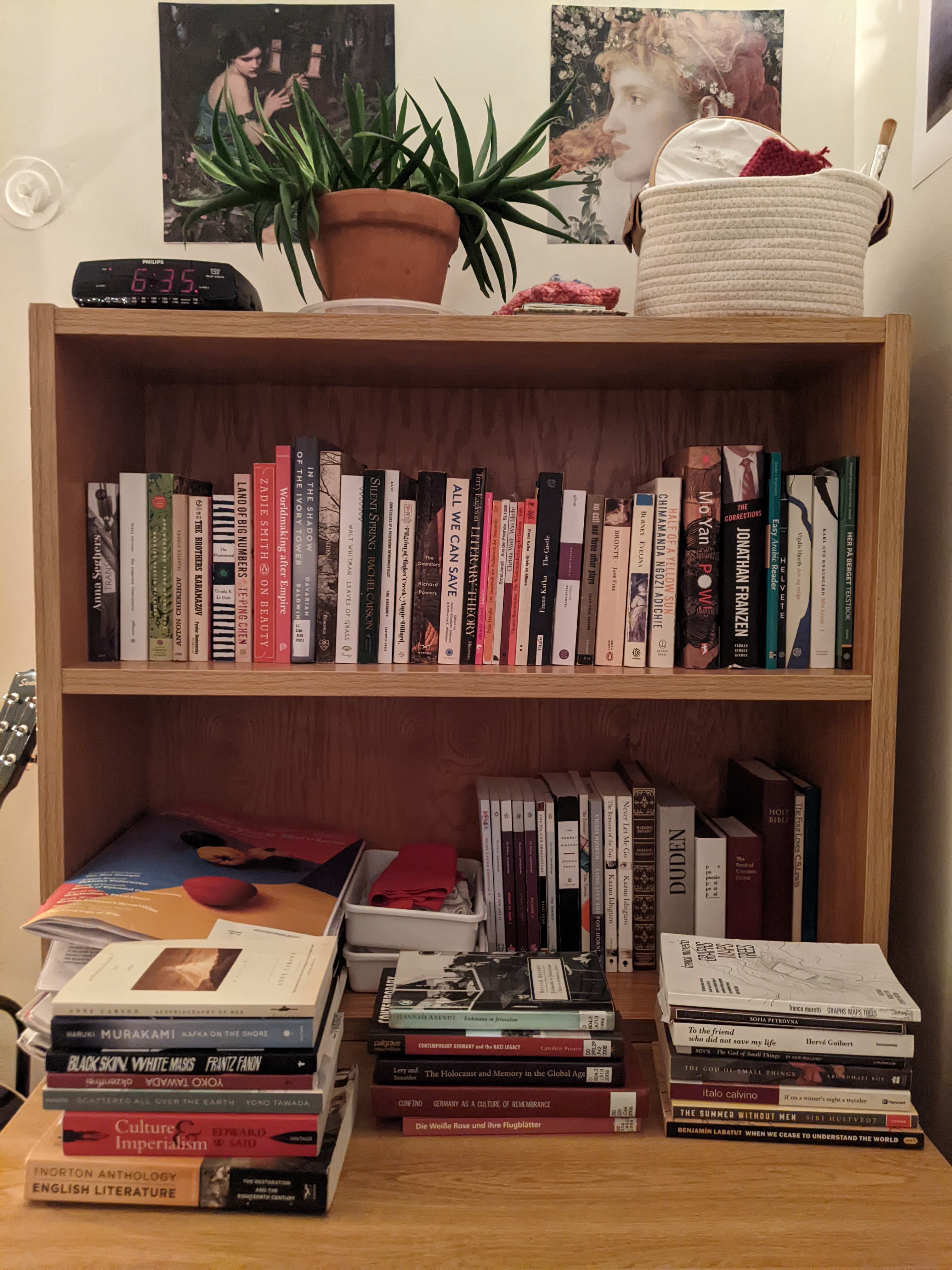
An English and German double major, writing tutor at the Shapiro Center for Writing, and Hamilton Prize for Creativity winner, Anna Tjeltveit ’23 loves reading and writing. As such, she has many books on her shelf that represent her many different interests, from political activism to German history to magical realism. Tjeltveit took The Argus on a tour of her bookshelf, discussing German studies, political activism on campus, and, of course, some of her favorite books.
The Argus: As an English and German double major, you have a lot of books on your shelf. What drew you to these two majors?
Anna Tjeltveit: I think I’ve known that I was gonna be an English major since I [learned how to] read and possibly before.
A lot of things have come and gone in my life, but ever since I was a kid, I’ve been really interested in stories and storytelling. I think that I’ve always, on some level, known that that’s what I want from my life, so that was always very set for me.
German came along in a very different way: It was unexpected, and I keep being surprised that it’s still in my life. I started learning German when I was in fourth grade. Then, the summer before my freshman year of high school, I heard from my dad about this immersive language summer camp. These are typical American summer camps, but all of the counselors speak a foreign language.
I went to the summer camp for two weeks, and it totally changed my life. I came in knowing a decent amount of German, but I had the moment at that camp where I transitioned from not being able to understand most things to being able to understand most things. I started thinking in German and I had my first dream in German, and I was like, “This is the most insane feeling ever, and I’m addicted, and I need to keep going.”
When I got to Wesleyan, I took [GERM213: “German Culture Today”], and I started realizing that, at the academic level, German is even cooler. The professor was [Assistant Professor of German Studies] Martin Baeumel, and I thought he was great, and the class was so much fun, so I just kept taking German classes and, before I knew it, I was also a German major.
A: I see a couple of library books on your shelf. Are you doing a thesis?
AT: I am doing a thesis. It’s a novel set in East Germany in 1984, and it’s about a nature conservationist who’s trying to save a family of beavers. Through the process of trying to save this one family, she uncovers the extent of environmental devastation that’s happening in the country and kind of has a mental break. My favorite genre of novel is “woman has a mental breakdown.” [It’s] been really cool ’cause it brings together both of my majors in really compelling ways.
A: When you’re not hard at work on your thesis, what kind of books do you like to read?
AT: I think that I always struggle to figure out what to read. For a while, I struggled a lot with feeling like there were books that I should read, which were usually the classics or the big names. In high school, I tried to read “War and Peace” for fun ’cause I wanted to be that kind of person. And I failed miserably.
I’ve realized with time that I’m able to read whatever I’m into, and so sometimes that is fun little fantasy adventures, like “Six of Crows” by Leigh Bardugo. I’m also really into magical realism and literary fiction. I just finished “The Summer Without Men” by Siri Hustvedt, and it got me out of such a big reading slump.
I’m into things that play with our expectations about plot and ask interesting questions about how we portray the world. So one of my favorite books of all time is “The Complete Cosmicomics” by Italo Calvino. It’s a short story collection where he takes an outdated scientific principle and turns it into a short story. It’s an insane book, but I’m so into it.
A: I’m assuming that some of these books were read for classes that you’ve taken. Are there any particular classes and/or professors that significantly influenced your time at Wesleyan?
AT: One of my favorite classes that I’ve taken at Wesleyan is [ENGL 221] “The African Novel” with [Associate Professor of English] Lily Saint. One of the things that we talked a lot about in that class is the idea that the form of narrative we commonly think of is a really European conception. The novel itself is only one way to tell stories, and it’s not necessarily the most natural one. And also that written language itself isn’t universal. That was a class that broke down my conceptions of what it was possible to do with words and with narrative.
I took [ENGL 210] “The Rise of the Novel” with [Associate Professor of English] Courtney Weiss Smith, who I love. That was also a class where we really analyzed how the novel form[ed], what routes it could have gone down, [and] what distinguishes the novel from other kinds of storytelling. We did a lot of critical thinking about gender, imperialism, and race. That stuff just sets my brain on fire in all the right ways.

A: There are a couple of books about organizing on your shelf. Can you tell me a little bit about work you’ve done with organizing at Wesleyan?
AT: I didn’t get involved with organizing straight away when I got to Wesleyan, but my second semester I got involved with Wes For Bernie—rest in peace—but that was really fun and exposed me to the Wesleyan organizing scene.
I was very briefly part of the Wesleyan Democrats, then kind of transitioned into the Wesleyan Democratic Socialists, ’cause they were doing more practice-oriented work and it ended up aligning a little bit more with my politics. And I’ve been working with them ever since.
One of the things I really care about—and actually, the book about organizing on my shelf right now, which is “In the Shadow of the Ivory Tower” [by Davarian L. Baldwin] is about this—[is] the relationship between colleges and the communities that they occupy, especially wealthy private institutions like Wesleyan. [As] a school that has a $1.6 billion endowment, how are we engaging in our community, where about 40% of people earn less than the cost of living in Connecticut?
We’ve been trying to create alternative routes of access to the community, so we spent a lot of last year building connections with different groups in Middletown. [For example,] with the Middletown Racial Justice Coalition, with the Free Center, [and] trying to talk to people from Middlesex Community College. That has reached a mini culmination in a potluck [on Saturday, Nov. 19]. That’s an open event for the community to come together and start having these conversations.
[It] has been pretty rewarding. There’s still work that we need to do, and I don’t think we’re doing it perfectly, but I think it’s important to make the effort.
A: I noticed that there was a Bible on your shelf. Can you talk a little about it?
AT: The really short answer to that is that my mom is an Episcopal priest. The slightly longer answer is that there are six generations of Episcopal priests on my mom’s side of the family, and my dad also went to seminary.
I come from a really religious family, but I’ve had a really complicated relationship with Christianity throughout the course of my life because I’m also a queer woman. Growing up in a church, [it was] truly one of the most loving and caring environments that I ever could have hoped for, [and] I really had a wonderful upbringing. But the knowledge that the global Christian community is oftentimes homophobic and knowing how many people have religious trauma was definitely something that I struggled with.
I remember I went to Shabbat with my really good friend, Abby Fisher [’23], who’s very involved with the Jewish community. And I was thinking, “It’s so wonderful that all of these people have a religious tradition that bonds them together. I wish I had something like that.” And then I was like, “I literally do.” But it was hard.
I recognize that it’s a really complicated situation, but in a lot of ways it’s difficult to be Christian on this campus, [and] it’s hard to explore any kind of religion where you actively believe in God and aren’t just surrounded by the culture of it on this campus because it’s a really secular place.
It was hard for me to feel like it was okay to openly talk about my relationship to faith, or even talk about the fact that I was struggling with it, or that I was thinking about it at all. But being friends with Abby was something that was really helpful there because she grew a lot closer to Judaism during her freshman year, and I think that really enabled me to be curious about my own faith. I started going to [the Church of the Holy Trinity] on Main Street in Middletown, which I still go to. They’re really wonderful.
I consider myself really firmly rooted in Christianity at this point. I sat down and I really thought about my values. I thought about the things that I believe and the things that motivate me. And when it comes down to it, what really motivates me is love. And that’s a very Christian idea.
There’s so many amazing gay and trans priests that I know, and so many female priests too. The church that I know and the church that I love is this place of never-ending love and good for others. And that’s something that I really wanna be a part of ’cause I actually think that that’s what Jesus is talking about more than anything else.
A: And when you graduate from Wesleyan at the end of this academic year, and you have to move all of these books out of your room, what is next for you?
AT: The plan and the hope is that I will be moving to Germany. I applied for a Fulbright English teaching assistantship in Germany for next year, so I’m really crossing my fingers that I’ll get that. If I don’t, I am also applying for a Fulbright-related teaching fellowship in Austria.
If I don’t [get either], I have plans C and D, which are also in Germany. My kind of broader overarching plan is I wanna spend a few years in Europe, living and experiencing life, and [finding] things to write about. And then I plan to maybe go back to the U.S. and get my MFA in fiction writing and possibly try to make it work as a creative writing academic [or] possibly teach German ’cause I would love that.
I know I’ll be writing no matter what. I can’t seem to quit it. But at the end of the day, how I’m paying my bills isn’t as important to me as just making sure I have joy in my life and I’m doing things I enjoy.
This interview has been edited for length and clarity.
Kat Struhar can be reached at kstruhar@wesleyan.edu.


Leave a Reply